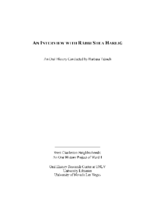Search the Special Collections and Archives Portal
Search Results

Transcript of interview with Rabbi Shea Harlig by Barbara Tabach, March 5, 2014
Date
Archival Collection
Description
Interview with Rabbi Shea Harlig by Barbara Tabach on March 5, 2014. In this interview, Rabbi Harlig discusses the Chabad movement of Orthodox Judaism and establishment of Chabad centers in Las Vegas and Southern Nevada. Rabbi Harlig talks about the property he has acquired for Chabad, and its outreach programs, including supervision of kosher kitchens in hotels. This interview was conducted for the Ward 1: West Charleston Neighborhoods oral history project, and therefore includes zoning and neighborhood discrimination issues, and a tour of the property.
Rabbi Shea Harlig arrived in Las Vegas in 1990 and settled in the Artesian Heights neighborhood of Las Vegas. As Director of Chabad of Southern Nevada, Rabbi Harlig focuses on religious outreach, education and social services, and has helped establish seven Chabad locations throughout the community and also built a school and educational program of the highest standards.
Text

Transcript of interview with Michael Saltman by Barbara Tabach, December 16, 2014
Date
Archival Collection
Description
In this interview, Michael Saltman recounts his family background, his schooling in Michigan, and living abroad in London and Munich. His travels to Israel in 1968 reinforced his connection to Judaism. Saltman and his wife, Sonja, moved to Las Vegas in 1975 and he began working with Larry Larkin, who eventually became his partner. He discusses several projects he completed with Larkin, including shopping centers and apartment complexes. He talks about the changes in Las Vegas that came about from the availability of financing from legitimate sources, and the population growth of the area. He then talks about his involvement in the local Jewish community with the Jewish Federation, Anti-Defamation League and Congregation Ner Tamid.
In 1942, Michael Saltman, the son of a rugged Canadian entrepreneur and of an educator, was born in Flint, Michigan. Michael spent a fulfilling childhood in Flint, where his family was involved in the Jewish community, even helping start a new temple. However, his life changed dramatically when his father passed away during his teenage years. At his mother's insistence, Michael went to law school after graduating from Michigan State University, and received his Juris doctor from Wayne State University. From Detroit, Michael headed to London to participate in an LL.M. program, though he quickly withdrew and landed a position with a life insurance and investment company in London. Michael soon relocated to the company's Geneva office, where his job included establishing operations in Israel. It was during these trips that he more intensely connected with Judaism and his Jewish identity. Michael left the company to join a former colleague at Shareholders Capital Corporation, where he met his wife Sonja. The couple moved to Munich, where they lived until 1975, until moving to Las Vegas. In Las Vegas, Michael became a successful real estate developer. His projects include apartments, shopping centers and office parks, like Village Apartments, Campus Village Shopping Center and Renaissance Center. He later opened Food 4 Less grocery stores in Nevada, Utah and California, eventually buying the Kansas-based company from Lou Falley. He and his partner later sold the company to Kroger. Michael served on the local Jewish Federation's board of directors, and Sonja is a longtime board member for the Anti-Defamation League's regional office in Las Vegas. In 2003, Michael and Sonja co-founded the Saltman Center for Conflict Resolution within William S. Boyd School of Law. Michael's other efforts to promote peaceful conflict resolution include the production of Streetball Hafla, a movie shot in Israel about Jewish and Palestinian teenagers interacting in basketball camp.
Text

Transcript of interview with Phyllis Friedman by Barbara Tabach, March 2, 2015
Date
Archival Collection
Description
In this interview, Phyllis Friedman reflects upon her extensive work with the ADL in Las Vegas. She discusses the city?s relatively low anti-Semitic activity, and how this allowed the Las Vegas ADL office to focus its efforts more broadly than in other cities. She also touches upon her family history, and how the community of Las Vegas has evolved since first visiting in 1963.
A Chicago native, Phyllis Friedman first came to Las Vegas in 1996 to become the Jewish Federation of Las Vegas? first foundation director. After two years, Friedman moved to year Los Angeles to work for ORT. Itching to get back to Las Vegas, in 2007, Friedman returned to the city to became director of the Nevada regional office of the Anti-Defamation League (ADL). In this position, she worked with schools as well as law enforcement, including the Federal Bureau of Investigation (FBI), teaching about tolerance and justice. She is a recipient of the FBI?s Las Vegas Division Director?s Community Leadership Award as well as the first awardee of Jewish Federation?s Jewish Professional of the Year. Three weeks into retirement, Friedman gave this interview, reflecting upon her extensive work with the ADL in Las Vegas. She discusses the city?s relatively low anti-Semitic activity, and how this allowed the Las Vegas ADL office to focus its efforts more broadly than in other cities. She also touches upon her family history, and how the community of Las Vegas has evolved since first visiting in 1963.
Text

Transcript of interview with Andrew and Debbie Levy by Barbara Tabach, September 12, 2016
Date
Archival Collection
Description
Andrew (Drew) Levy was born and raised in Las Vegas, Nevada, where his family became prominent civic and real estate leaders. His grandfather was Harry Levy, a former Las Vegas City Commissioner, and his father Alvin Levy was a former councilman. Drew is always proud to say that he never left Las Vegas and of partnering with his father in the Levy Realty Company. While growing up, Drew it was easy for a teenager to enjoy the perks that could accompany his family?s civic persona?such as casino shows, events and meeting early Las Vegas casino executives like Moe Dalitz. After graduation from Clark High School, Drew attended Arizona State University. It was in Tempe that he met Debbie Cheek, his future wife. When Debbie arrived in Las Vegas, she enrolled at the University of Nevada, Las Vegas, where she finished her degree and started her accounting practice. She ran her business for ten years before opening Art Starts Here, an art school. In the 1990s, Debbie?s passion for art led her to be involved in the creation of First Friday, a local monthly art festival. She also teaches a summer art camp for the Adelson Educational Campus. Drew and Debbie became deeply involved in the many Jewish congregations in Las Vegas. Blossoming first at Temple Beth Sholom where they were married in 1980, Debbie sat on the preschool board and oversaw the temple board, while Drew was the advisor for the youth group. The couple later joined Congregation Ner Tamid where Drew was congregation president from 1999 to 2000 and Debbie was board treasurer in 2001. Debbie includes stories of her conversion to Judaism and keeping kosher. In this interview, Drew and Debbie Levy reflect on changes they see in Las Vegas, from when Drew was a kid to the times they raised their own daughters, Sarah and Jenna, here. Looking at the larger picture of the city, they describe booms in the real estate market and growth in the artistic and cultural aspects of Las Vegas. They provide a perspective of the growth of the local Jewish community.
Text

Transcript of interview with Toshiyuki "George" Goto by Christina Oda, February 26, 1979
Date
Archival Collection
Description
On February 26, 1979, Christina Oda interviewed Toshiyuki “George” Goto (born 1922 in Huntington Beach, California) about his life in Nevada. Goto first talks about his move to Nevada in 1951 before talking about his family, church activities, politics, and recreational activities. He then discusses the building, economic, and environmental changes in Las Vegas. Goto later talks in depth about his profession in landscaping, including the work he completed for some of the hotels and resorts built on the Las Vegas Strip. The latter part of the interview includes discussion about Goto’s Japanese ancestry and his perceptions as a minority when first moving to and living in Las Vegas. The interview’s conclusion covers the topics of social activities and Goto’s organization of a local chapter of the Japanese American Citizens League.
Text

Transcript of interview with Theda Kay Grinnell by Fletcher Corey, February 28, 1977
Date
Archival Collection
Description
On February 28, 1977, Fletcher Corey interviewed Theda Kay Grinnell (born 1935 in New London, Iowa) about her life in Las Vegas, Nevada. Grinnell first talks about her move to Nevada and both her and her husband’s work at the Nevada Test Site. She also talks about the atomic blasts, competition with Russia, and her employment that followed her work at the Test Site. Grinnell later talks about her church membership and goes into detail about the race riots and how they involved and impacted her and her son. The end of the interview includes discussion on flash floods, the culinary union, how World War II affected the Las Vegas industry, and the social changes in Las Vegas.
Text

Transcript of interview with Judith L. Hamblin by Margaret Stambro, March 30, 1976
Date
Archival Collection
Description
On March 30, 1976, collector Margaret Stambro interviewed schoolteacher and registered medical stenographer, Judith L. Hamblin (born June 11, 1941 in Las Vegas, Nevada) in her home in Henderson, Nevada. This interview covers the history of Henderson, local schools and teachers, and Helldorado. Also during this interview, Mrs. Hamblin discusses her fondness for Lake Mead, the Basic Magnesium Plant, Nellis Air Force Base, and the early aboveground atomic blasts.
Text

Transcript of interview with Vincent "Vince" Hart by Andrew Bannister, February 21, 1980
Date
Archival Collection
Description
On February 21, 1980, Andrew Bannister interviewed Vincent “Vince” Hart (born on July 7, 1945 in Jerusalem, Palestine) in Hart’s office about his experience with youth soccer, both as a coach and as a player. Hart discusses his family background and his residential history in the United Kingdom and the United States before explaining the development of the men’s soccer team at the University of Nevada, Las Vegas. He describes his impact on the program and his hopes for future student athletes. The two then delve into a discussion of the fundamentals of soccer and different strategies that are commonly used. They then conclude with a brief description of Vince’s experiences with meeting a variety of professional soccer players at the Las Vegas Stadium.
Text

Transcript of interview with Ethel S. Hatch by P. Kohlman, November 24, 1975
Date
Archival Collection
Description
On November 24, 1975, collector P. Kohlman interviewed housewife, Ethel S. Hatch (born April 11th, 1914 in Valentine, Texas) in her home in Las Vegas, Nevada. This interview covers the history of Las Vegas from 1939 to 1975. Mrs. Hatch also talks about ranching in Nevada, Rex Bell, development on the Strip, the first hotels, and early local shopping culture. She refers to Block Sixteen as Block Thirteen when discussing the Red Light District. The interview concludes with discussion surrounding tree-lined streets, the Helldorado Club, and Fremont Street.
Text

Transcript of interview with Doris Evans by Lance Kenny, March 12, 1977
Date
Archival Collection
Description
On March 12, 1977, Lance Kenny interviewed realtor, Doris Evans (born in Dexter, Missouri) at her place of business, Doris Evans Realty, located at 1100 Cahlan Drive, Las Vegas, Nevada. This interview covers Boulder City and Las Vegas [1937-1977]. During the interview Doris discusses real estate, local hotels, early transportation, and social recreation. She also mentions the nuclear tests, crime, environmental changes, and marriage and family life in Boulder City and Las Vegas. Doris’s business partner, Patty (Renette Beringer), is also present during the interview and helps Doris recall the year they started Doris Evans Realty in Las Vegas, Nevada.
Text
